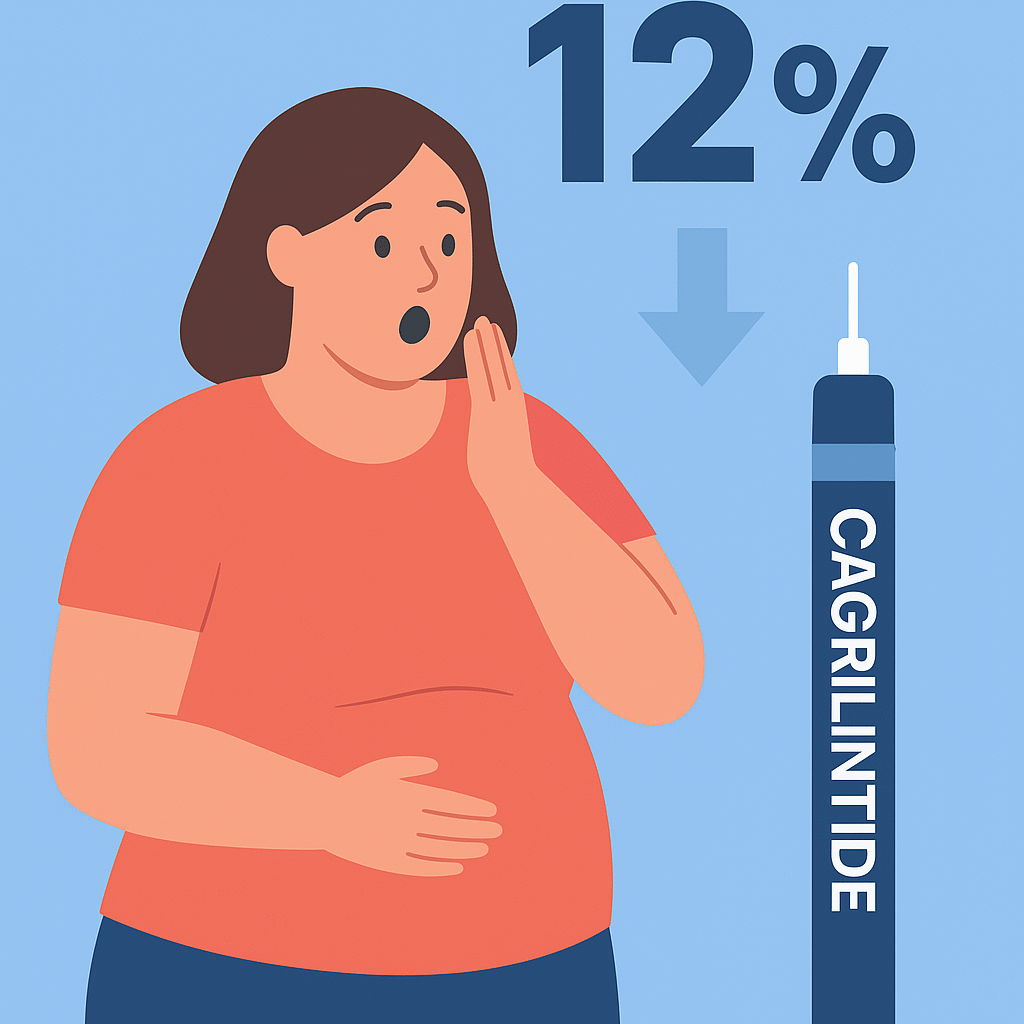Written By: Pharmacally Medical News Desk
Novo Nordisk presented new phase 3 data on cagrilintide, a once-weekly amylin analogue, at the European Association for the Study of Diabetes (EASD) congress which is happening in Vienna, Austria from 15 to 19 September 2025. The results came from a sub-analysis of the REDEFINE-1 trial and showed that cagrilintide led to significant weight loss in adults with overweight or obesity that did not have diabetes. Based on these results, the company plans to launch a new phase 3 Programme called RENEW later this year.
Study design and participants
The REDEFINE-1 trial is a large phase 3 study testing treatments for obesity. It mainly looked at the combination of semaglutide and cagrilintide, but also included groups on cagrilintide alone and on placebo. Study included adults with overweight or obesity who did not have type 2 diabetes. Participants were randomly assigned to receive either once-weekly cagrilintide 2.4 mg or a placebo, along with lifestyle support. The treatment period lasted 68 weeks, and the main goal was to measure the average change in body weight between the two groups.
Key results and Safety
After 68 weeks of treatment, people taking cagrilintide 2.4 mg once weekly lost an average of 11.8% of their body weight, which was about 12.5 kilograms. In comparison, those in the placebo group lost only about 2–3%, or roughly 2.5 kilograms. More people taking cagrilintide were able to lose 10–15% or more of their body weight compared to those on placebo. The most common side effects were stomach-related issues like nausea, vomiting, constipation, and diarrhoea. These side effects were usually mild or moderate, often improved with time, and only a small number of participants stopped treatment because of them.
What is amylin and how does it work?
Amylin is a natural hormone made by the pancreas and released at the same time as insulin after meals. Its main job is to help control blood sugar and appetite. It does this by slowing down how quickly food leaves the stomach, reducing hunger signals in the brain, and making people feel full sooner. Because of these effects, amylin can support weight loss. Cagrilintide is a synthetic, long-acting version of amylin that can be given once a week. By mimicking the natural hormone, it helps people eat less and lose weight.
Effect of Cagrilintide
On average, people who took cagrilintide lost nearly 12% of their body weight over 68 weeks. This amount of weight loss is considered important in the treatment of obesity. However the percentage weight loss is at lower side as compared to the newest weight loss drugs that can produce even greater results. Still, a loss of around 10–12% is enough to improve many health problems linked to excess weight, such as high blood pressure, type 2 diabetes risk, and joint strain. This shows that cagrilintide on its own can provide real health benefits for people living with obesity.
Obesity Treatment
The combination of semaglutide and cagrilintide, called CagriSema, has already shown greater weight loss of about 23% at 68 weeks. Cagrilintide on its own may still be useful, especially for people who cannot take GLP-1 drugs or as part of a mix of treatments. Novo Nordisk plans to start the RENEW phase 3 programme in late 2025. These new studies will test cagrilintide alone in larger and more varied groups of patients, including those with type 2 diabetes.
The new results from REDEFINE-1 show that cagrilintide can help people lose a meaningful amount of weight and is generally well tolerated. While the combination therapy CagriSema remains the stronger option for maximum weight loss, cagrilintide alone has clear potential as a treatment. With the RENEW Programme about to begin, the next few years will determine how this amylin analogue will be used in the growing field of obesity care. If the upcoming studies confirm these findings, cagrilintide could become an important addition to the range of treatments available for people struggling with obesity.
References
Novo Nordisk presents phase 3 data for next-generation amylin cagrilintide, leading to advancement into dedicated clinical Programme, 16 September 2025, Novo Nordisk, https://www.novonordisk.com/content/nncorp/global/en/news-and-media/news-and-ir-materials/news-details.html?id=916427
D’Ascanio AM, Mullally JA, Frishman WH. Cagrilintide: A Long-Acting Amylin Analog for the Treatment of Obesity. Cardiol Rev. 2024 Jan-Feb 01;32(1):83-90. doi: 10.1097/CRD.0000000000000513. Epub 2023 Oct 20. PMID: 36883831.

